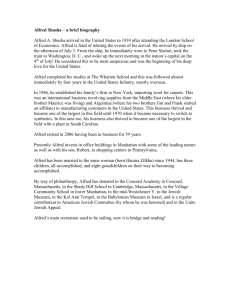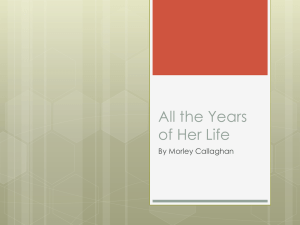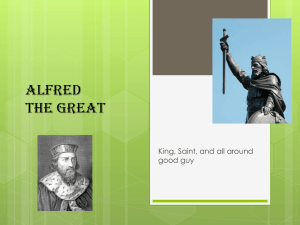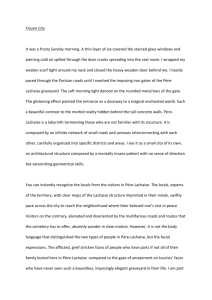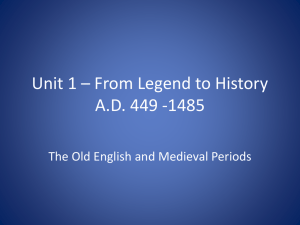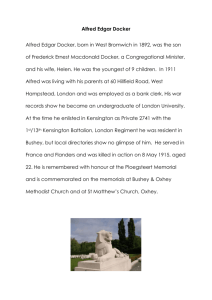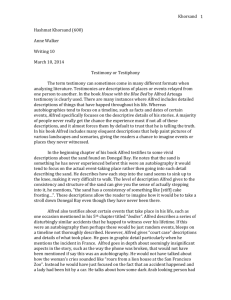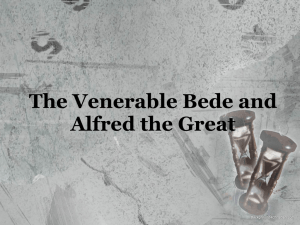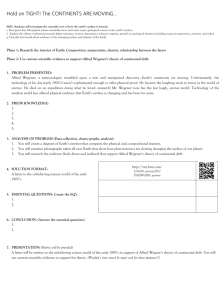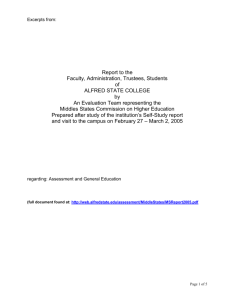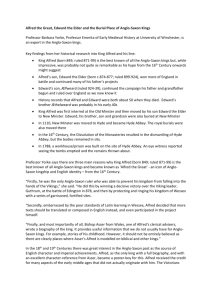University of Kent at Canterbury
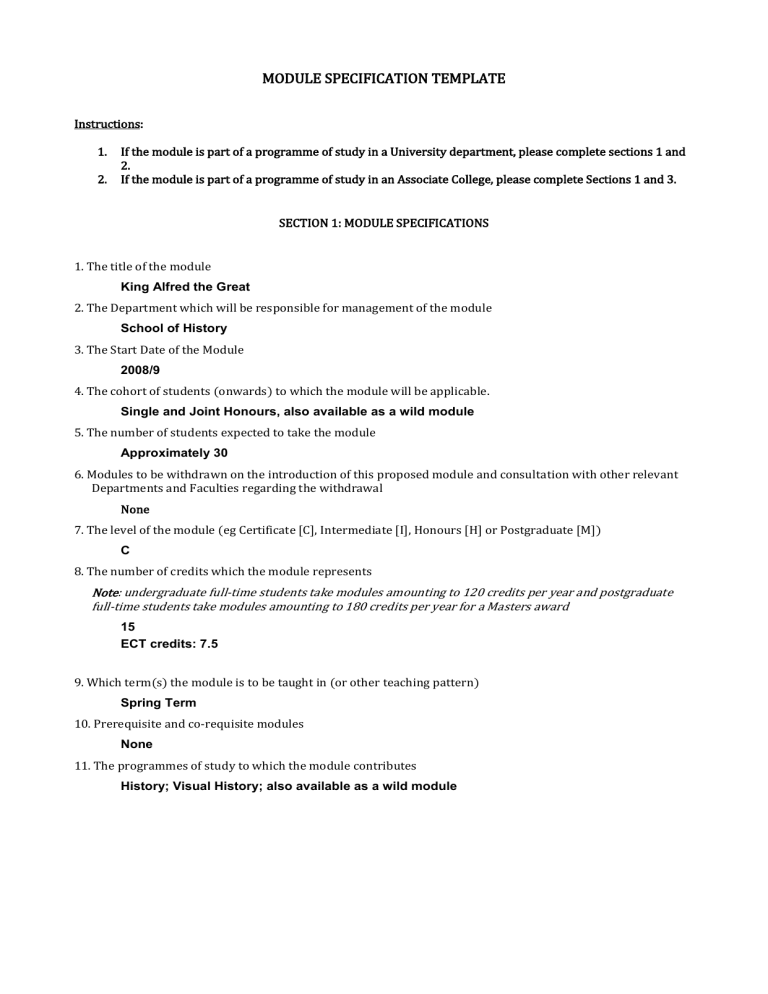
MODULE SPECIFICATION TEMPLATE
Instructions:
1.
If the module is part of a programme of study in a University department, please complete sections 1 and
2.
2.
If the module is part of a programme of study in an Associate College, please complete Sections 1 and 3.
SECTION 1: MODULE SPECIFICATIONS
1. The title of the module
King Alfred the Great
2. The Department which will be responsible for management of the module
School of History
3. The Start Date of the Module
2008/9
4. The cohort of students (onwards) to which the module will be applicable.
Single and Joint Honours, also available as a wild module
5. The number of students expected to take the module
Approximately 30
6. Modules to be withdrawn on the introduction of this proposed module and consultation with other relevant
Departments and Faculties regarding the withdrawal
None
7. The level of the module (eg Certificate [C], Intermediate [I], Honours [H] or Postgraduate [M])
C
8. The number of credits which the module represents
Note: undergraduate full-time students take modules amounting to 120 credits per year and postgraduate full-time students take modules amounting to 180 credits per year for a Masters award
15
ECT credits: 7.5
9. Which term(s) the module is to be taught in (or other teaching pattern)
Spring Term
10. Prerequisite and co-requisite modules
None
11. The programmes of study to which the module contributes
History; Visual History; also available as a wild module
12. The intended subject specific learning outcomes and, as appropriate, their relationship to programme learning outcomes
1. To cultivate critical awareness of the political, religious, economic, and cultural history of
Wessex during the reign of Alfred the Great (S of H, Learning Outcomes, C1)
2. To acquire skills in the interpretation of a range of primary sources (S of H, Learning
Outcomes, C2)
3. To gain understanding of historiographic and interpretative issues during the period under consideration (S of H, Learning Outcomes, C3)
13. The intended generic learning outcomes and, as appropriate, their relationship to programme learning outcomes
1. Students will develop their ability to communicate about complex concepts effectively verbally and in writing (S of H, Learning Outcomes, B1-4)
2. Students will gain awareness of the historical importance of non-written sources and the ability to relate these to documentary and secondary sources (S of H, Learning Outcomes,
A1-2, B3)
3.
Students will develop their ability to assess the strengths and limitations of sources (S of H,
Learning Outcomes, A3)
14. A synopsis of the curriculum
Alfred, king of Wessex from 871 to 899, is one of the few Anglo-Saxon kings most English people have heard about. But what do we really know about him? This course will examine the political, economic and cultural history of Alfred's Wessex. We will seek to understand how Alfred defeated the Vikings and transformed the fortunes of his kingdom. In order to do so we will pay special attention to the sources for his reign, including the Life of Alfred, but also the Anglo-Saxon Chronicle, his lawcode and Alfred's own writings together with evidence from archaeological excavations, coins and other artefacts. We will examine the controversy about whether the Life of Alfred is a forgery and the possible consequences for his reputation. This course will provide not only a detailed study of Alfred's reign but also an introduction to Anglo-Saxon history and the sources available for studying it.
Key themes will include: The Vikings; the defence of Wessex; the sources of Alfred's power; the reform of the Church; Alfred as image-maker; Alfredian art; Alfred's own writings;
Asser's Life of Alfred.
15. Indicative Reading List
R. Abels Alfred the Great: War, Kingship and Culture in Anglo-Saxon England (1998)
J. Campbell, ed., The Anglo-Saxons (1982)
S. Keynes, M. Lapidge, trans., Alfred the Great: Asser's Life of King Alfred and other
Contemporary Sources (Penguin, 1983)
T. Reuter, ed., Alfred the Great: Papers from the Eleventh Centenary Conference (2003)
16. Learning and Teaching Methods, including the nature and number of contact hours and the total study hours which will be expected of students, and how these relate to achievement of the intended learning outcomes
This course will consist of five lectures, ten one-hour seminars and one writing week. Students will be expected to complete 150 hours of study including these contact hours.
Students will be expected to prepare for each seminar by reading set texts and a selection from an additional reading list. (S of H, Learning Outcomes, D5). They will demonstrate their knowledge and understanding each week by contributing to discussion in the seminar of questions for which they will have prepared whilst doing this reading.
17. Assessment methods and how these relate to testing achievement of the intended learning outcomes
Coursework will amount to 50% of the final mark, and will be based on two equally-weighed essays, written on thematic topics (S of H, Learning Outcomes, B1-4, C3, D6). The written examination (worth the other 50% of the final mark) will test students’ command of the sources and historiographical issues examined in the course and their ability to think critically about them
(S of H, Learning Outcomes, A1-3, C1, C3).
18. Implications for learning resources, including staff, library, IT and space
Staff: This course will be taught by Dr Helen Gittos.
Library: A few recent publications may need to be acquired by the library.
IT: Lectures will require access to a PowerPoint projector.
Space: one seminar room will be required for c. four hours each week.
19. A statement confirming that, as far as can be reasonably anticipated, the curriculum, learning and teaching methods and forms of assessment do not present any non-justifiable disadvantage to students with disabilities
As far as can be anticipated this course will not present any non-justifiable disadvantages to students with disabilities.
SECTION 2: MODULE IS PART OF A PROGRAMME OF STUDY IN A UNIVERSITY DEPARTMENT
Statement by the Director of Learning and Teaching: "I confirm I have been consulted on the above module proposal and have given advice on the correct procedures and required content of module proposals"
................................................................
Director of Learning and Teaching
..............................................
Date
…………………………………………………
Print Name
Statement by the Head of Department: "I confirm that the Department has approved the introduction of the module and, where the module is proposed by Departmental staff, will be responsible for its resourcing"
.................................................................
Head of Department
…………………………………………………….
Print Name
..............................................
Date
